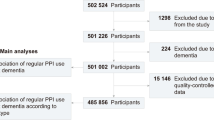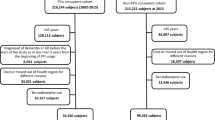Abstract
Introduction
Long-term use of proton pump inhibitors (PPIs) has been associated with an increased risk of Alzheimer’s disease (AD) in observational studies. The role of exposure duration, and whether this applies to other dementia subtypes, has not been explored in these studies.
Objective
The aim was to study the association between long-term use of PPIs (or of histamine-2 receptor antagonists [H2RAs], as a negative control) and the risk of developing AD or vascular dementia (VaD).
Methods
We conducted a case–control analysis on the UK-based Clinical Practice Research Datalink (CPRD). We identified 41,029 patients aged ≥ 65 years with newly diagnosed AD or VaD between 1998 and 2015 and matched them 1:1 to dementia-free controls on age, sex, calendar time, general practice, and number of years of recorded history. We applied conditional logistic regression analyses to calculate adjusted odds ratios (aORs), with 95% confidence intervals (CIs), of developing AD or VaD in relation to previous use of PPIs or H2RAs, categorized by exposure duration.
Results
As compared to non-use, long-term PPI use (≥ 100 prescriptions) was not associated with an increased risk of developing AD (aOR 0.88, 95% CI 0.80–0.97) or VaD (aOR 1.18, 95% CI 1.04–1.33). Neither was long-term use of H2RAs (≥ 20 prescriptions) associated with an increased risk of developing AD (aOR 0.94, 95% CI 0.87–1.02) or VaD (aOR 0.99, 95% CI 0.89–1.10).
Conclusion
In this large, case-control analysis, we did not find any evidence for an increased risk of either AD or VaD related to PPI or H2RA use.

Similar content being viewed by others
References
AstraZeneca UK Limited. Losec MUPS tablets 10/20 mg [Internet]. SPC (Summary of Product Characteristics. [cited 2016 May 9]. Available from: https://www.medicines.org.uk/emc/search.
van Vliet EPM, Otten HJ, Rudolphus A, Knoester PD, Hoogsteden HC, Kuipers EJ, et al. Inappropriate prescription of proton pump inhibitors on two pulmonary medicine wards. Eur J Gastroenterol Hepatol. 2008;20:608–12.
Zink DA, Pohlman M, Barnes M, Cannon ME. Long-term use of acid suppression started inappropriately during hospitalization. Aliment Pharmacol Ther. 2005;21:1203–9.
Leonard J, Marshall JK, Moayyedi P. Systematic review of the risk of enteric infection in patients taking acid suppression. Am J Gastroenterol. 2007;102:2047–56.
Sarkar M. Proton-pump inhibitor use and the risk for community-acquired pneumonia. Ann Intern Med. 2008;149:391–8.
Lazarus B, Chen Y, Wilson FP, Sang Y, Chang AR, Coresh J, et al. Proton pump inhibitor use and the risk of chronic kidney disease. JAMA Intern Med. 2016;176:238–46.
Yang Y-X, Lewis JD, Epstein S, Metz DC. Long-term proton pump inhibitor therapy and risk of hip fracture. JAMA. 2006;296:2947–53.
Freedberg DE, Kim LS, Yang Y-X. The risks and benefits of long-term use of proton pump inhibitors: expert review and best practice advice from the american gastroenterological association. Gastroenterology. 2017;152:706–15.
Gomm W, von Holt K, Thomé F, Broich K, Maier W, Fink A, et al. Association of proton pump inhibitors with risk of dementia: a pharmacoepidemiological claims data analysis. JAMA Neurol. 2016;73(4):410–6.
Haenisch B, von Holt K, Wiese B, Prokein J, Lange C, Ernst A, et al. Risk of dementia in elderly patients with the use of proton pump inhibitors. Eur Arch Psychiatry Clin Neurosci. 2015;265:419–28.
Gray SL, Walker RL, Dublin S, Yu O, Aiello Bowles EJ, Anderson ML, et al. Proton pump inhibitor use and dementia risk: prospective population-based study. J Am Geriatr Soc. 2018;66:247–53.
Taipale H, Tolppanen A-M, Tiihonen M, Tanskanen A, Tiihonen J, Hartikainen S. No Association between proton pump inhibitor use and risk of Alzheimer’s disease. Am J Gastroenterol. 2017;112(12):1802–8.
Park S-K, Baek Y-H, Pratt N, Kalisch Ellett L, Shin J-Y. The uncertainty of the association between proton pump inhibitor use and the risk of dementia: prescription sequence symmetry analysis using a Korean healthcare database between 2002 and 2013. Drug Saf. 2018;41:615–24 .
Goldstein FC, Steenland K, Zhao L, Wharton W, Levey AI, Hajjar I. Proton pump inhibitors and risk of mild cognitive impairment and dementia. J Am Geriatr Soc. 2017;65:1969–74.
Badiola N, Alcalde V, Pujol A, Münter LM, Multhaup G, Lleó A, et al. The proton-pump inhibitor lansoprazole enhances amyloid beta production. PLoS One. 2013;8:1–8.
Sodhi RK, Singh N. Defensive effect of lansoprazole in dementia of AD type in mice exposed to streptozotocin and cholesterol enriched diet. PLoS One. 2013;8:e70487.
Yepuri G, Sukhovershin R, Nazari-Shafti TZ, Petrascheck M, Ghebre YT, Cooke JP. Proton pump inhibitors accelerate endothelial senescence. Circ Res. 2016;118:e36–42.
Lam JR, Schneider JL, Zhao W, Corley DA. Proton pump inhibitor and histamine 2 receptor antagonist use and vitamin B12 deficiency. JAMA. 2013;310:2435–42.
O’Leary F, Allman-Farinelli M, Samman S. Vitamin B12 status, cognitive decline and dementia: a systematic review of prospective cohort studies. Br J Nutr. 2012;108:1948–61.
Strom BL. Study designs available for pharmacoepidemiology studies. Pharmacoepidemiology. 4th ed. 2007. p. 61–9.
Stevens T, Livingston G, Kitchen G, Manela M, Walker Z, Katona C. Islington study of dementia subtypes in the community. Br J Psychiatry. 2002;180:270–6.
Jick SS, Kaye JA, Vasilakis-Scaramozza C, Garcia Rodríguez LA, Ruigómez A, Meier CR, et al. Validity of the general practice research database. Pharmacotherapy. 2003;23:686–9.
Wood L, Martinez C. The general practice research database: role in pharmacovigilance. Drug Saf. 2004;27:871–81.
Khan NF, Harrison SE, Rose PW. Validity of diagnostic coding within the General Practice Research Database: a systematic review. Br J Gen Pract. 2010;60:e128-36.
Herrett E, Gallagher AM, Bhaskaran K, Forbes H, Mathur R, van Staa T, et al. Data resource profile: Clinical Practice Research Datalink (CPRD). Int J Epidemiol. 2015;44:827–36.
Seshadri S, Zornberg GL, Derby LE, Myers MW, Jick H, Drachman DA. Postmenopausal estrogen replacement therapy and the risk of Alzheimer disease. Arch Neurol. 2001;58:435–40.
Davies NM, Kehoe PG, Ben-Shlomo Y, Martin RM. Associations of anti-hypertensive treatments with Alzheimer’s disease, vascular dementia, and other dementias. J Alzheimers Dis. 2011;26:699–708.
Jick H, Zornberg G, Jick S, Seshadri S, Drachman D. Statins and the risk of dementia. Lancet. 2000;356:1627–31.
Martinez C, Jones RW, Rietbrock S. Trends in the prevalence of antipsychotic drug use among patients with Alzheimer’s disease and other dementias including those treated with antidementia drugs in the community in the UK: a cohort study. BMJ Open. 2013;3:e002080.
Imfeld P, Toovey S, Jick SS, Meier CR. Influenza infections and risk of Alzheimer’s disease. Brain Behav Immun. 2016;57:187–92.
Imfeld P, Brauchli Pernus YB, Jick SS, Meier CR. Epidemiology, co-morbidities, and medication use of patients with Alzheimer’s disease or vascular dementia in the UK. J Alzheimers Dis. 2013;35:565–73.
Gray SL, Walker R, Dublin S, Haneuse S, Crane PK, Breitner JCS, et al. Histamine-2 receptor antagonist use and incident dementia in an older cohort. J Am Geriatr Soc. 2011;59:251–7.
Boustani M, Hall KS, Lane KA, Aljadhey H, Gao S, Unverzagt F, et al. The association between cognition and histamine-2 receptor antagonists in African Americans. J Am Geriatr Soc. 2007;55:1248–53.
Fitzpatrick AL, Kuller LH, Lopez OL, Diehr P, O’Meara ES, Longstreth WT, et al. Midlife and late-life obesity and the risk of dementia: cardiovascular health study. Arch Neurol. 2009;66:336–42.
Rusanen M, Kivipelto M, Quesenberry CP, Zhou J, Whitmer RA. Heavy smoking in midlife and long-term risk of Alzheimer disease and vascular dementia. Arch Intern Med. 2011;171:333–9.
Booker A, Jacob LE, Rapp M, Bohlken J, Kostev K. Risk factors for dementia diagnosis in German primary care practices. Int Psychogeriatr. 2016;28:1059–65.
Horwitz RI, Feinstein AR. The problem of “protopathic bias” in case-control studies. Am J Med. 1980;68:255–8.
Maes ML, Fixen DR, Linnebur SA. Adverse effects of proton-pump inhibitor use in older adults: a review of the evidence. Ther Adv Drug Saf Rev. 2017;8:273–97.
Acknowledgements
We thank Pascal Egger for the programming and technical support.
Author information
Authors and Affiliations
Corresponding author
Ethics declarations
Funding
This study did not receive any funding.
Conflict of interest
Patrick Imfeld, Michael Bodmer, Susan S. Jick, and Christoph R. Meier have no conflicts of interest.
Electronic supplementary material
Below is the link to the electronic supplementary material.
Rights and permissions
About this article
Cite this article
Imfeld, P., Bodmer, M., Jick, S.S. et al. Proton Pump Inhibitor Use and Risk of Developing Alzheimer’s Disease or Vascular Dementia: A Case–Control Analysis. Drug Saf 41, 1387–1396 (2018). https://doi.org/10.1007/s40264-018-0704-9
Published:
Issue Date:
DOI: https://doi.org/10.1007/s40264-018-0704-9




